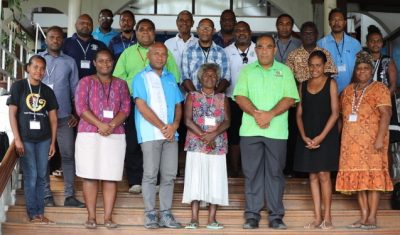National Climate Services consultation workshop underway in Honiara
“Effective climate services will facilitate climate-smart decisions that will reduce the impacts of weather extreme events and climate change impacts and related disasters, improve food security, health outcomes, water resource management, and decision making in other sectors”.
This statement was made by Dr Melchior Mataki Permanent Secretary in the Ministry of Environment Climate Change Disaster Management and Meteorology (MECDM) in his remarks to open a National Climate Services Consultation Workshop on 16th November 2021 in Honiara.
The Solomon Islands Meteorological Service (SIMS) is working to address the challenges of making quality weather and climate observations, understanding climate predictions and the use of climate information to better serve the needs of the public and stakeholders. This is a priority for SIMS to bridge the gap between the climate information, developed by scientists and service providers, and the practical needs of end-users.
With climate change being a major threat to the sustainable development of the Solomon Islands, the need for improved climate services and tailored climate products for sectors such as the Malaria Early Action Rainfall Watch for North Guadalcanal must be developed to support decision-making at all levels.
Realizing these needs the World Meteorological Organization initiated the Global Framework for Climate Services (GFCS) for four sectors that include Agriculture, Health, Disaster Risk Reduction, water Resources and the recent inclusion was Energy. The consultations will help the Solomon Islands Meteorological Service to tailor the GFCS to the context of the Solomon Islands.
In line with MECDMs corporate plan and the Government Policy to “strengthen and support the national meteorological service” the ministry is continuing to expand its weather and climate observation network through externally funded projects, and more recently with the support from UNDP. Enhancing climate and weather observation is critical to enhance climate services.
The workshop was attended by various stakeholders including Fisheries, Water Resources, Agriculture, Tourism, Forestry, Health the Media, NGOs and People with Disabilities.
-MECDM Press

